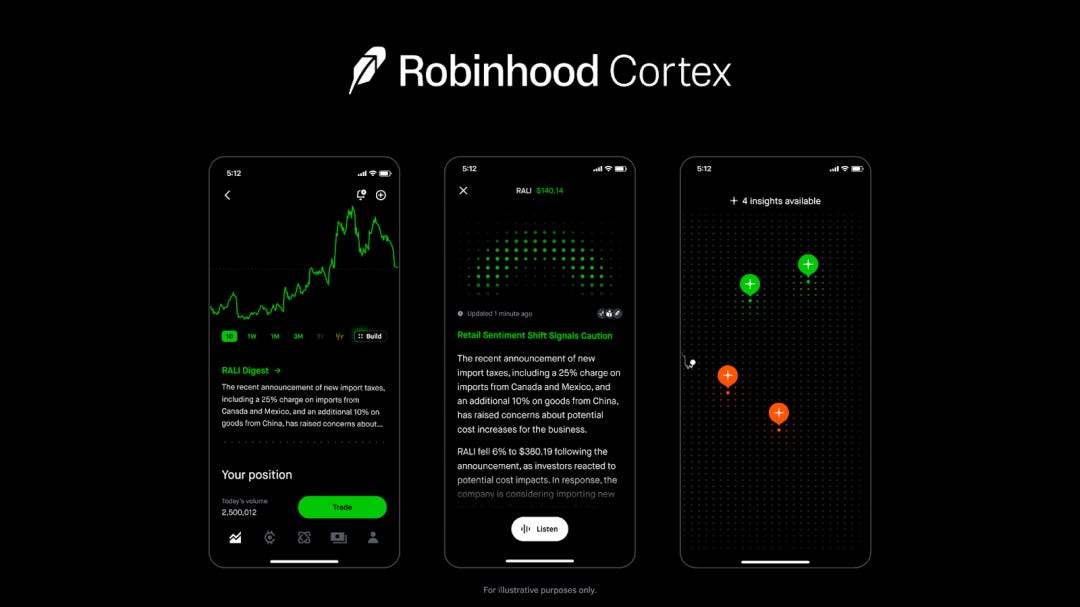📰 Robinhood Banking: A Game-Changer or a Risky Bet?
Robinhood is launching its own private banking service exclusively for Gold members. Is this a bold strategic move that could reshape the industry and challenge traditional banks?
Robinhood HOOD 0.00%↑ wants to be more than just a trading app. At its second annual Gold keynote event, the company announced the launch of Robinhood Banking, along with new AI-driven investment strategies and a digital private banking experience for Gold members. Can Robinhood compete with private banks, or will its move into high-end services clash with its brand?
A luxury banking experience for the masses?
Launching this fall, Robinhood Banking combines credit, checking, and savings accounts into a single app. While Robinhood itself is not a bank, Coastal Community Bank, an FDIC member, provides the banking services. The promised benefits are significant:
4.00% APY on savings—9x the national average rate.
Private banking services, including estate planning and tax advisory.
Up to $2.5 million in FDIC insurance.
Luxury perks, such as access to events like the Met Gala and Formula 1 in Monaco, private jets, chauffeurs, and exclusive vacation resorts.
Cash delivered to your home on demand, eliminating the need for ATMs.
International payments in 100+ currencies and instant transfers between Robinhood accounts.
Family accounts with child accounts, allowances, and spending controls.
Source: Robinhood
Robinhood Banking is available only to Robinhood Gold members, positioning itself as an alternative to traditional banks with a focus on simplicity and luxury. But can it truly compete with established private banks like Goldman Sachs and Morgan Stanley?
A threat to traditional private banks?
Traditional private banks provide personalized advice and exclusive investment options for wealthy clients. Robinhood, on the other hand, focuses on technology and low costs to attract rich customers, offering transparency, convenience, and good cash returns instead of tailored advice.
But winning the trust of high-net-worth clients will be a challenge. Private banking isn’t just about returns, it’s about relationships, networks, and exclusivity, areas where traditional players have a significant edge.
AI-driven investment portfolios
In addition to banking services, Robinhood is also introducing Robinhood Strategies, an AI-powered wealth management solution that goes beyond a standard robo-advisor. This system combines:
Actively managed portfolios with ETFs and stocks.
Dynamic insights into portfolio performance and market trends.
Transparent fees: a flat $250 annual management fee for Gold members, with no extra charges for larger portfolios.
Tax optimization, including tax-loss harvesting and smart selling strategies.
Gold members can now open a portfolio with no management fees on the first $1,000 (for non-Gold members, the limit is $500). Robinhood Strategies will roll out to all users starting in April.
AI as an investment assistant
Robinhood also unveiled Robinhood Cortex, an AI tool that provides real-time analysis and insights. Features at launch include:
Stock Digests, which summarize why a stock is rising or falling.
Trade Builder, a tool that helps users develop trading strategies based on market signals and technical analysis.
Robinhood Cortex does not execute trades but acts as an AI assistant to help investors make better decisions. It will be available to Gold members later this year.
Source: Robinhood
Brand identity: mass appeal vs. elite status
Robinhood built its brand on making investing easy and accessible. But private banking is about exclusivity, trust, and personal relationships, areas where traditional banks like Goldman Sachs have the upper hand.
With luxury perks and AI-driven wealth management, Robinhood hopes to attract wealthy clients who prefer tech-driven convenience over personal advisors. But will the rich trust an app over a seasoned banker? And will Robinhood’s core users feel left out by this shift toward premium services?
If it works, Robinhood could redefine private banking for a new generation. If not, it risks losing both the wealthy and the everyday investor. What do you think, is this a smart move or a risky bet?
Source: Reuters, FX News Group
Disclaimer:
The information and opinions provided in this article are for informational and educational purposes only and should not be considered as investment advice or a recommendation to buy, sell, or hold any financial product, security, or asset. The Future Investors does not provide personalized investment advice and is not a licensed financial advisor. Always do your own research before making any investment decisions and consult with a qualified financial professional before making any investment decisions. Please consult the general disclaimer for more details.





